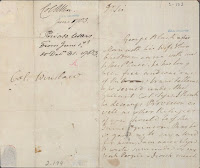They have no country to go to—no other asylum(Robert Morse, 1783)
 |
| Fredericton Region Museum; Artist: Claire Vautour, 2020 |
When the first flotilla of Loyalist refugees departed New York harbour at Sandy Hook on Sunday May 27, 1783, it was a magnificent sight to see. The Spring Fleet of 50 sail included 11 ships destined for the River St John. Five more flotillas would follow over the summer and fall, carrying a total of over 10,000 Loyalists to the River St John. On board were 2,831 Black Loyalists, whose names were recorded in the Book of Negroes.
 |
| Col Isaac Allen’s letter to Edward Winslow about George Black, 1783; UNB Archives & Special Collections |
In the Book of Negroes were listed both free and enslaved men, women, and children. The destination of each vessel was also listed, along with a physical description of each individual, and remarks on their status of freedom. Among the places listed as destinations was the “River St. John’s” (or Saint John's River). Upwards of 500 people were destined for the River St. John. Some of these individuals settled in York-Sunbury counties, in communities such as present-day Fredericton, Keswick, and Maugerville. Many were freed slaves, others were indentured servants
 |
| Col Isaac Allen’s letter to Edward Winslow about George Black, 1783; UNB Archives & Special Collections |
or slaves, and many had served as regimental soldiers. Among the pages can be found the names of freed slaves George Black and his family (wife Ann, and children Reuben, aged 7 and Sukey, aged 5); as well as Besse, with her son Gull and baby Kitty, who were the property of Nicholas Humphries; and Joseph Williams, a Black Pioneer in the Kings American Dragoons. The evacuation of New York gave promise of land and hope for freedom...
 |
| Inspection Roll of Negroes Book No. 1, 4/23/1793 - 9/1793; National Archives M332; RG 360; Washington, DC |
